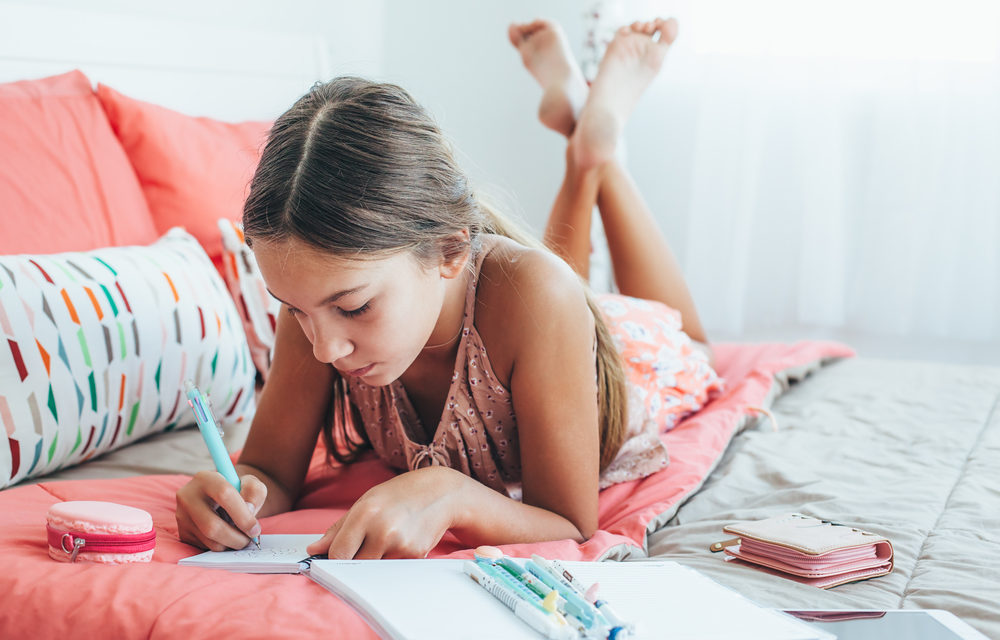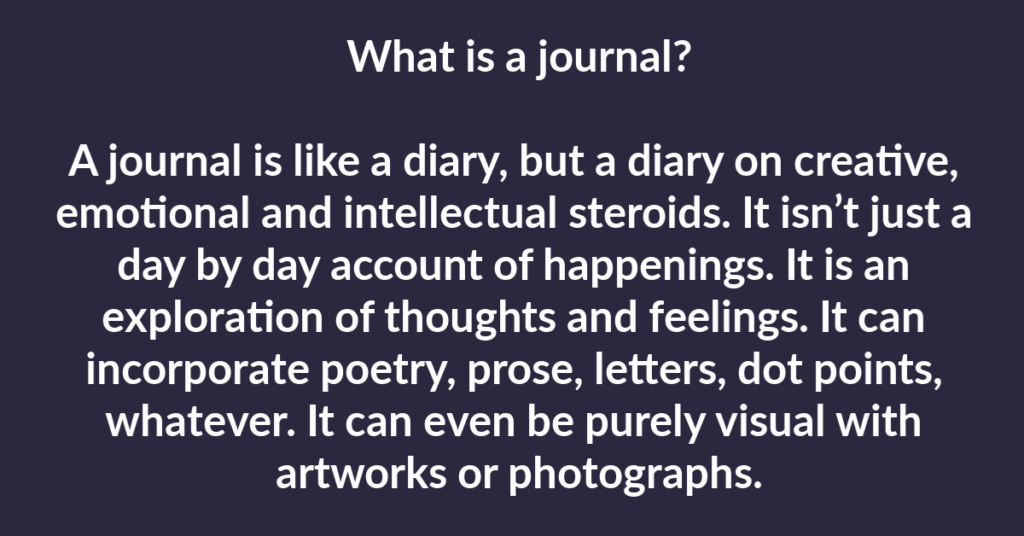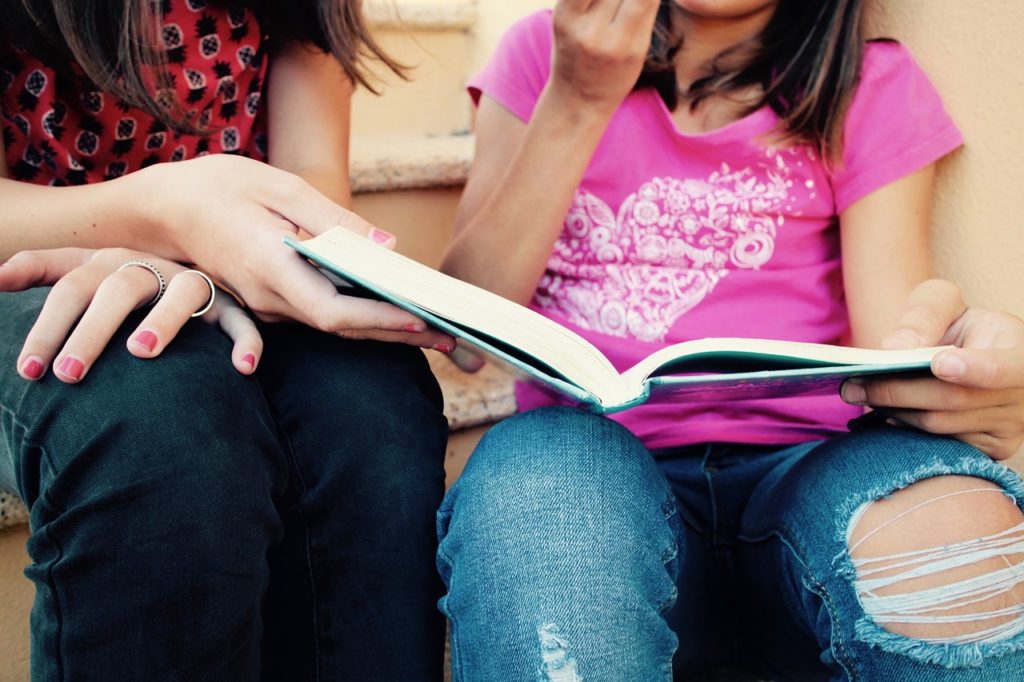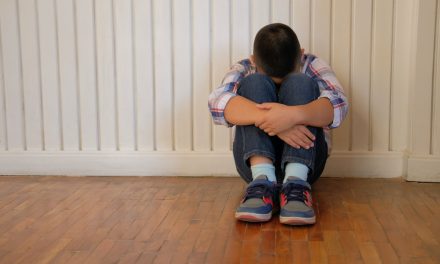The advantages of journal writing are terrific, especially for kids. Here are 7 great reasons why you and your kids should be journalling.
Recently I was cleaning out my back shed and I came across my journals from high school. Oh dear. Reading them made me cringe. Everything was so heartfelt and there was so much angst.
Once that initial mortification wore off, I was quite sympathetic to high school me and even a bit proud. I was at boarding school, very homesick and going through normal teen drama. I was working it all out for myself, right there on the page. It was my first and probably most important use of journalling.
7 ways you and your child can use a journal:
1. Journalling can be used to regulate distressed emotional states.
Daniel J Siegel, renowned author of the Whole-BrainChild says, “Writing in a journal activates the narrator function of our minds. Studies have suggested that simply writing down our account of a challenging experience can lower physiological reactivity and increase our sense of wellbeing, even if we never show what we’ve written to anyone else.”
Often, we write ourselves into an understanding of how we feel. The overwhelming feelings become more ordered. When they are more ordered and down on paper they don’t seem so big anymore. We can look at them and name them, instead of drowning in them.
The act of focusing on the experience and its associated feelings, then articulating them can be very cathartic. Keeping a journal was one of the ways I managed the distress of a long-term, painful illness. It also allowed me to look back and see how far I had progressed.
2. Journals can help us communicate with people we love
Although journals are often private and personal, they don’t have to be. Parenting expert, Rebecca Sparrow advocates having a shared journal with your child. It is often difficult for kids to talk to their parents about how they are feeling. Also, there is embarrassing stuff like periods or a crush or feeling lonely. Communication often breaks down and that is the absolute last thing we want.
So, the idea of Rebecca’s Book of Secrets is that both parent and child can write in it about how they are feeling, questions they have or things they want the other to know. They then leave it in a place the other will find it. She says the first rule is, ‘What happens in the book, stays in the book’. It’s a safe space. I love this idea; it is very powerful and a good habit to get into when kids are young.
3. Journalling is a great gratitude practice
Gratitude practice is proven to have a powerful impact on the way we see the world and our place in it. Journalling about the good things in life can lead to a more optimistic perspective.
My friend Jacqui has kept a gratitude photo journal this year. Every day she has taken a photograph of something in her life that brings her joy or that she is grateful for. The act of taking those photos makes her focus on the positive, but she also ends up with a collection of positive images she can draw on when she feels the need.
4. Journalling allows us to be creative
In an era when we appreciate the absolute necessity of creativity in our work and daily lives, there is still a disappointing lack of creative writing in the school curriculum. Journalling is a brilliant tool for developing and experimenting with creativity.
When we write creatively, we become more creative generally and that way of being comes with us into our wider experiences. The good thing about being creative in a journal is, there is no threat of getting it ‘wrong’ or not being good enough.
5. In journalling, traumatic experiences can lose their potency.
A great deal of our distress in trauma comes from not being able to make sense of a situation or event. In writing, we marry logic with emotion and create a coherent storyline that helps us make sense of our experiences. Obviously, writing alone will not overcome trauma, but it is a powerful practice and one often recommended by psychologists.
Another problem with traumatic experiences is that they often come wrapped in a lot of shame. Talking about those feelings feels impossible. Writing allows us to explore feelings without exposing us to shame. Ironically, as we write, the shame often lifts.
6. Journalling as mindfulness
Journalling, particularly on a specific topic with a time limit, is a good mindfulness practice. We become engrossed in the task and we stop dwelling in the past or fretting about the future. You can start with five minutes a day, and gradually increase to ten minutes.
I used to begin English classes in this way. Journalling calmed kids down for the beginning of a period of learning and it fuelled their creativity at the same time. They had a big list of suggested prompts or they could write about anything on their mind. After a while, they used to walk into class and start journalling without me even saying anything. They liked it.
7. Journalling can declutter the mind
When we write about a worrying experience or idea, we are literally and figuratively, ‘putting it down’. A big component of stress and fatigue is the ‘mental load’ we carry around each day. Journalling can help lessen that load. It frees us up to get on with other things…like sleep.
I find that even writing a to-do list for the next day before going to bed stops me from ruminating. Journalling before bed can be a way of ensuring you sleep easy.
Finally…
Journalling is like a lot of things that are good for us. It doesn’t necessarily feel good to start with (Jogging, I’m looking at you!). However, it’s worth the initial effort and persistence. At the very least your child might find their journals in their back shed one day and think, “Awww…young me was intense but pretty cool”.
In case you’re still not sold. I’m just going to leave this list here for you to have a look at. You know…just in case there’s any doubt!
There is documented evidence of journalling assisting in the treatment of:
- Post-traumatic stress
- Anxiety
- Depression
- Obsessive-compulsive disorder
- Grief and loss
- Chronic illness issues
- Substance abuse
- Eating disorders
- Interpersonal relationship issues
- Communication skill issues
- Low self-esteem
Why not follow Linda’s fortnightly blog? You’ll receive free, useful information to help support your kids as they navigate their school years.
Linda would love to meet you on her Facebook page here
Linda Stade has worked in various teaching and management roles in education for twenty-eight years. She has worked in government and private schools, country and city, single-sex and co-ed. Currently, she is a writer, speaker and consultant in Western Australia. You can find out more about her work here.









